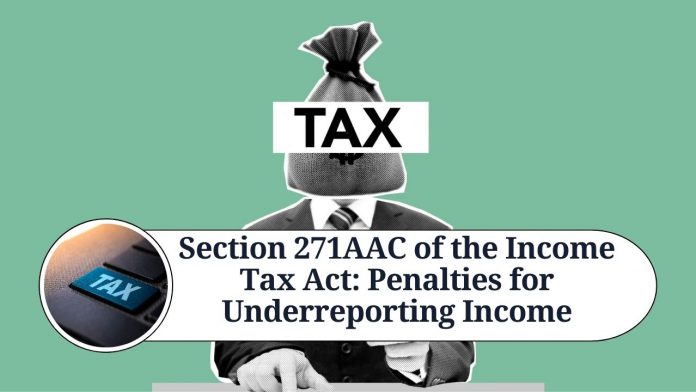The Indian Income Tax Act is a comprehensive piece of legislation that governs the taxation of income in India. Section 271AAC of the Income Tax Act is an important provision that deals with penalties for underreporting income. This provision was introduced in the Finance Act 2016 and applies to income earned in the assessment year 2017-18 and subsequent years.
In this blog, we will discuss the key provisions of Section 271AAC and the penalties that can be levied for underreporting income.
What is Section 271AAC?
Section 271AAC of the Income Tax Act deals with penalties for underreporting income. Under this provision, if the assessing officer determines that a taxpayer has underreported his or her income, then the taxpayer will be liable to pay a penalty of 50% of the amount of tax payable on the underreported income.
The penalty under Section 271AAC is in addition to the tax payable on the underreported income. In other words, if a taxpayer underreports his or her income and is subsequently found to be liable for additional tax of Rs. 1,00,000, then the penalty under Section 271AAC would be Rs. 50,000 (50% of Rs. 1,00,000).
It is important to note that the penalty under Section 271AAC is mandatory and cannot be waived by the assessing officer. However, the taxpayer has the right to appeal against the penalty before the Commissioner of Income Tax (Appeals) and then before the Income Tax Appellate Tribunal (ITAT).
When is Section 271AAC applicable?
Section 271AAC applies in cases where the assessing officer determines that the taxpayer has underreported his or her income. Underreporting of income can occur in a number of ways, including:
- Misreporting of income: This refers to the incorrect reporting of income by the taxpayer, either knowingly or unknowingly. For example, if a taxpayer receives rental income from a property and does not report it in his or her income tax return, then this would be considered misreporting of income.
- Concealment of income: This refers to the deliberate concealment of income by the taxpayer. For example, if a taxpayer receives income from a business but does not report it in his or her income tax return and also does not maintain proper books of accounts, then this would be considered concealment of income.
- Inaccurate particulars of income: This refers to the reporting of inaccurate particulars of income by the taxpayer. For example, if a taxpayer reports a lower amount of income than what he or she actually earned, then this would be considered inaccurate particulars of income.
In order to determine whether underreporting of income has occurred, the assessing officer will conduct an assessment of the taxpayer’s income tax return and any other relevant documents. If it is determined that the taxpayer has underreported his or her income, then the provisions of Section 271AAC will apply.
Conclusion:
Section 271AAC of the Income Tax Act is an important provision that deals with penalties for underreporting income. Taxpayers should be careful to ensure that they accurately report all their income in their income tax returns and maintain proper books of accounts. Failure to do so could result in significant penalties under Section 271AAC. If you have any doubts about your tax liabilities, it is always advisable to consult a tax professional.
Read more useful content:
- section 234e of income tax act
- section 286 of income tax act
- section 90a of income tax act
- section 40a(7) of income tax act
- section 226(3) of income tax act
- section 24 of income tax act
Frequently Asked Questions (FAQs)
Q: What is Section 271AAC of the Income Tax Act?
A: Section 271AAC is a provision that deals with penalties for underreporting of income in the Indian Income Tax Act.
Q: What is the penalty under Section 271AAC?
A: The penalty under Section 271AAC is 50% of the amount of tax payable on the underreported income.
Q: Is the penalty under Section 271AAC mandatory?
A: Yes, the penalty under Section 271AAC is mandatory and cannot be waived by the assessing officer.
Q: Can a taxpayer appeal against the penalty under Section 271AAC?
A: Yes, a taxpayer can appeal against the penalty before the Commissioner of Income Tax (Appeals) and then before the Income Tax Appellate Tribunal (ITAT).
Q: When is Section 271AAC applicable?
A: Section 271AAC is applicable when the assessing officer determines that the taxpayer has underreported his or her income. This can occur due to misreporting of income, concealment of income, or inaccurate particulars of income.
Q: What are the consequences of underreporting income under Section 271AAC?
A: The consequences of underreporting income under Section 271AAC include payment of a penalty of 50% of the amount of tax payable on the underreported income in addition to the tax payable on the underreported income.
Q: Can a taxpayer avoid penalties under Section 271AAC?
A: Yes, a taxpayer can avoid penalties under Section 271AAC by accurately reporting all income in their income tax returns and maintaining proper books of accounts.
Q: Is Section 271AAC applicable to all taxpayers?
A: Yes, Section 271AAC is applicable to all taxpayers who underreport their income, regardless of whether they are individuals, companies, or other entities.
Q: What is the time limit for imposing penalties under Section 271AAC?
A: The time limit for imposing penalties under Section 271AAC is six years from the end of the assessment year in which the income was first assessable.
Q: Can a taxpayer be prosecuted for underreporting income under Section 271AAC?
A: No, a taxpayer cannot be prosecuted for underreporting income under Section 271AAC. It only imposes penalties for underreporting income. However, prosecution may be initiated under other provisions of the Income Tax Act.




















